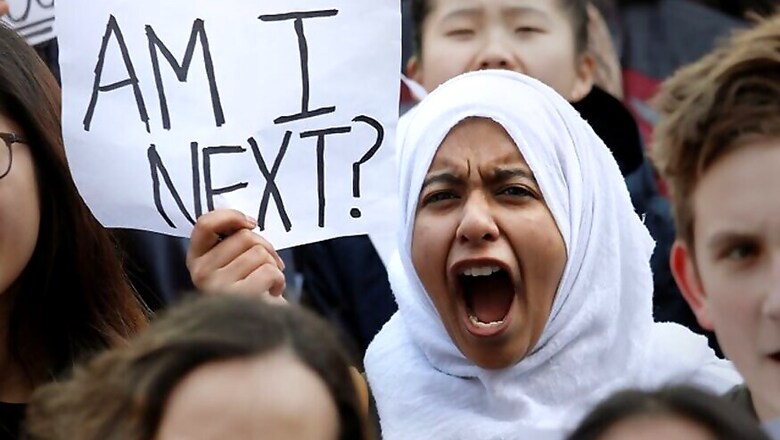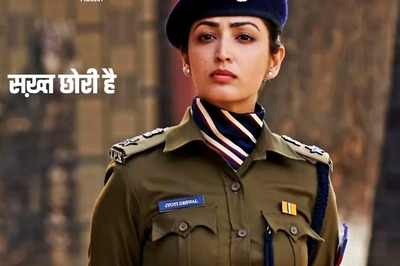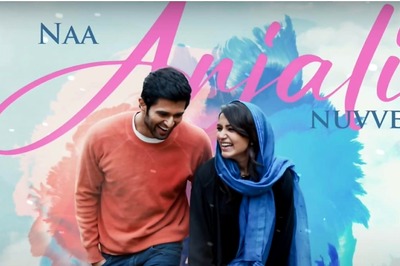
views
Parkland: US students spilled out of classrooms by the thousands on Wednesday morning, waving signs and chanting slogans like "We want change" in a coast-to-coast protest against gun violence prompted by a deadly rampage at a Florida high school last month.
The #ENOUGH National School Walkout began in the Eastern time zone at 10 a.m. (1400 GMT) and was scheduled to last 17 minutes, though many protests went longer. The protest rolled westward, with students in other time zones walking out at 10 a.m. local time, including at Colorado's Columbine High School, where two gunmen killed 13 people in 1999.
The announced duration of the walkouts was intended to commemorate the 17 students and staff killed at Marjory Stoneman Douglas High School in Parkland, Florida, on Feb. 14. The massacre was the latest in a series of shootings that have plagued U.S. schools and colleges since the Columbine attack.
While many school districts gave their blessings for the protests, others warned of discipline for any students who joined the walkout, though many defied the warnings and left school anyway.
In Parkland, thousands of students slowly filed onto the Stoneman Douglas school football field to the applause of families and supporters beyond the fences as law enforcement officers looked on. News helicopters thrummed overhead.
Ty Thompson, the school's principal, called for the "biggest group hug," and the students obliged around the 50-yard line.
"We want change!" students chanted on the sidewalks outside the school. "Can you hear the children screaming?" read one of the signs.
At New York City's Fiorello H. LaGuardia High School, crowds of students poured into the streets of Manhattan, many dressed in orange, the colour adopted in recent years by the gun-control movement.
"Thoughts and prayers are not enough," read one sign, needling the rote response many lawmakers make after mass shootings. At 10 a.m., the hundreds of students sat down on the sidewalk, filling half a city block, and fell silent.
LOBBYING LAWMAKERS
The walkouts were part of a burgeoning, grassroots movement that grew out of the Parkland attack. Some survivors have lobbied state and federal lawmakers, and even met with President Donald Trump, to call for new restrictions on gun ownership, a right protected by the Second Amendment of the U.S. Constitution.
"We don't feel safe in schools anymore," said Sarah Chatfield, a high school student from Maryland, standing in a crowd of hundreds protesting outside the White House, with some sitting silent with their backs turned.
"Trump is talking about arming teachers with guns," the 15-year-old said. "That is not a step in the right direction."
Some of the students began marching toward Capitol Hill. "Hey hey, ho ho, the NRA has got to go!" they chanted, referring to the powerful gun-rights interest group, the National Rifle Association. Some Democratic lawmakers emerged from the Republican-controlled U.S. Congress to praise the students.
The Parkland survivors' efforts helped bring about a tightening of Florida's gun laws last week, when the minimum age for buying any kind of gun was raised to 21 years from 18, although lawmakers rejected a ban on the sort of semiautomatic rifle used in the Parkland attack.
In Washington, however, plans to strengthen the background-check system for gun sales, among other measures, appear to be languishing.
Students crammed into a packed hearing on Wednesday before the U.S. Senate Judiciary Committee about gun laws and school safety, which was to include testimony from federal law enforcement officials and the father of one of the Parkland victims.
The House of Representatives was set to debate and pass a bill on Wednesday to spend $50 million a year on training schools and law enforcement agencies to detect potential violent acts before they occur. It would not, however, allow any of the money to be used to arm teachers or other school officials. The measure has broad bipartisan support.
Students from more than 2,800 schools and groups are joining the walkouts, many with the backing of their school districts, according to the event's organizers, who also coordinated the Women's March protests staged nationwide over the past two years.
The protests took place a day after Florida prosecutors said they would seek the death penalty for Nikolas Cruz, who has been charged with 17 counts of premeditated murder and 17 counts of attempted murder in the Parkland attack.
STUDENTS UNDETERRED
In districts where school authorities warned against joining the protests, some students protested anyway.
Some 200 students walked out of the Council Rock High School North building in Newtown, Pennsylvania, despite warnings from school administration that doing so would bring discipline. The district, citing safety concerns, had organised an alternative event, allowing students to walk out of their classrooms but remain in the building.
"Students deserve the right to go to school feeling safe and comfortable, not feeling scared that their school will be the next target," a student said into a megaphone to the group outside.
In Bentonville, Arkansas, a high school student was suspended on Tuesday after handing out unauthorised flyers promoting the walkout, local news media reported.
Students reciting the names of the Parkland victims outside Lakewood High School in Cleveland, Ohio, brushed off a heckle from a passing driver, who shouted out: "Go back to class."




















Comments
0 comment